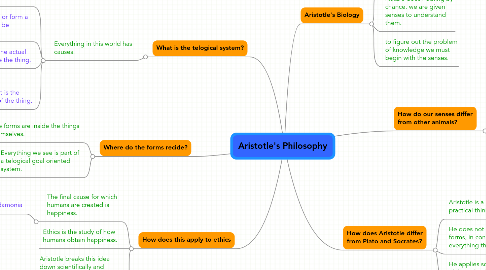Aristotle's Philosophy
par tayler bonfert


1. How does this apply to ethics
1.1. The final cause for which humans are created is happiness.
1.1.1. Eudamonia
1.2. Ethics is the study of how humans obtain happiness.
1.3. Aristotle breaks this idea down scientifically and provides specific ways for a person to become virtuous.
2. Where do the forms recide?
2.1. The forms are inside the things themselves.
2.2. Everything we see is part of a telogical goal oriented system.
2.2.1. The human goal is to be happy.
3. What is the telogical system?
3.1. Everything in this world has causes.
3.1.1. (Material Cause)- The material form which the thing is made of.
3.1.2. (Formal Cause)- The shape or form a thing must take in order to be recognized.
3.1.3. (Efficient Cause)- The actual force used to make the thing.
3.1.4. (Final Cause)- What is the ultimate purpose of the thing.
3.1.4.1. The final cause is to teach and the viewer to gain some sort of knowledge.
3.1.4.2. To teach us virtue of reason.
